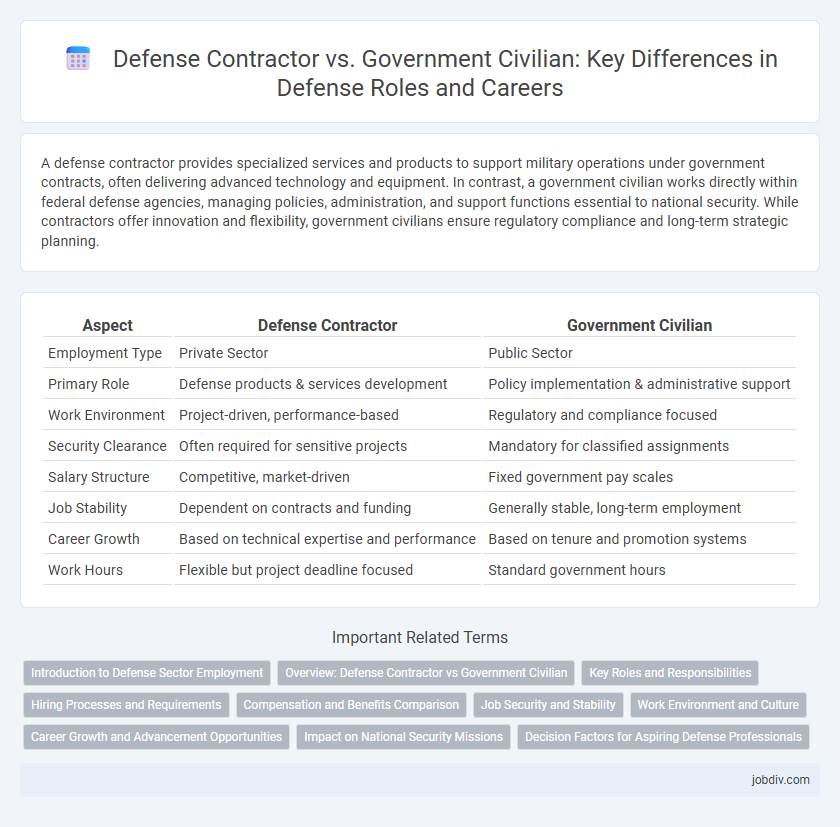A defense contractor provides specialized services and products to support military operations under government contracts, often delivering advanced technology and equipment. In contrast, a government civilian works directly within federal defense agencies, managing policies, administration, and support functions essential to national security. While contractors offer innovation and flexibility, government civilians ensure regulatory compliance and long-term strategic planning.
Table of Comparison
| Aspect | Defense Contractor | Government Civilian |
|---|---|---|
| Employment Type | Private Sector | Public Sector |
| Primary Role | Defense products & services development | Policy implementation & administrative support |
| Work Environment | Project-driven, performance-based | Regulatory and compliance focused |
| Security Clearance | Often required for sensitive projects | Mandatory for classified assignments |
| Salary Structure | Competitive, market-driven | Fixed government pay scales |
| Job Stability | Dependent on contracts and funding | Generally stable, long-term employment |
| Career Growth | Based on technical expertise and performance | Based on tenure and promotion systems |
| Work Hours | Flexible but project deadline focused | Standard government hours |
Introduction to Defense Sector Employment
Defense contractors play a crucial role in delivering advanced technology and specialized services to military operations, often working under government contracts to support national security objectives. Government civilians within the defense sector manage policy implementation, procurement, and administrative functions essential for maintaining efficient defense operations. Both positions require a deep understanding of defense protocols, compliance standards, and the ability to navigate complex regulatory environments.
Overview: Defense Contractor vs Government Civilian
Defense contractors operate as private sector companies providing specialized military technology, equipment, and services under government contracts, while government civilians are federal employees working directly within defense agencies to support policy implementation, administration, and operational functions. Contractors often bring technical expertise and innovation, enabling rapid development and deployment of defense solutions, whereas government civilians ensure regulatory compliance, continuity, and oversight within defense programs. The collaboration between contractors and government civilians is critical for maintaining national security, balancing efficiency, accountability, and strategic objectives.
Key Roles and Responsibilities
Defense contractors specialize in designing, manufacturing, and maintaining military technology and equipment, ensuring operational readiness through innovation and technical expertise. Government civilians manage defense policies, oversee acquisition processes, and coordinate between military branches and contractors to align projects with national security objectives. Both play critical roles in sustaining defense capabilities, with contractors focusing on implementation and civilians on strategic oversight.
Hiring Processes and Requirements
Defense contractors typically require candidates to possess specialized security clearances and relevant military or technical experience, with rigorous background checks conducted to comply with government regulations. Government civilians undergo a structured hiring process emphasizing federal qualifications, veterans' preference, and experience related to defense policies and administration. Both hiring pathways demand adherence to strict ethical standards and eligibility criteria aligned with national security priorities.
Compensation and Benefits Comparison
Defense contractors often receive higher base salaries compared to government civilians due to competitive industry standards, while government civilians benefit from comprehensive federal benefits packages including retirement plans, healthcare, and paid leave. Contractors typically have variable compensation tied to project performance or contract terms, whereas government civilians enjoy more stable and predictable income with guaranteed annual raises based on federal pay scales. Despite lower base pay, government civilian roles frequently offer stronger long-term job security and pension benefits, making total compensation packages competitive when benefits are fully accounted for.
Job Security and Stability
Defense contractors often experience fluctuating job security due to contract-based employment and budget changes, creating a less stable work environment compared to government civilians. Government civilian positions provide higher stability with guaranteed employment, consistent benefits, and protections under federal regulations. Job security for government civilians is typically stronger due to the non-competitive nature of their roles and longstanding institutional continuity.
Work Environment and Culture
Defense contractors operate in a fast-paced, innovation-driven work environment emphasizing project deadlines and client specifications, often involving collaboration across multiple industries and defense sectors. Government civilians typically experience a structured, policy-oriented culture with a focus on regulatory compliance, stability, and formal hierarchies within federal agencies like the Department of Defense. Both environments prioritize national security, but contractors promote agility and commercial expertise, while government civilians emphasize procedural consistency and long-term institutional knowledge.
Career Growth and Advancement Opportunities
Defense contractors often offer faster career growth and specialized advancement opportunities driven by project-based performance metrics and innovation demands. Government civilians benefit from structured promotion paths, stability, and comprehensive federal training programs, providing a steady progression within bureaucratic frameworks. Both career paths present unique advantages depending on priorities like agility in skill development versus long-term job security.
Impact on National Security Missions
Defense contractors provide specialized expertise and advanced technology crucial for the rapid development and deployment of defense systems, directly enhancing national security missions. Government civilians ensure continuity, compliance, and institutional knowledge within defense agencies, maintaining operational integrity and policy adherence. The collaboration between contractors and civilians balances innovation with regulatory oversight, maximizing mission effectiveness and safeguarding national interests.
Decision Factors for Aspiring Defense Professionals
Decision factors for aspiring defense professionals include evaluating the stability and benefits offered by government civilian roles versus the innovation-driven environment and project diversity found in defense contractor positions. Government civilian jobs typically provide long-term job security, comprehensive benefits, and a clear career progression within federal agencies like the Department of Defense. Defense contractors often offer competitive salaries, exposure to cutting-edge technology, and opportunities to work on multi-year defense projects supporting military operations and national security.
Defense Contractor vs Government Civilian Infographic

 jobdiv.com
jobdiv.com